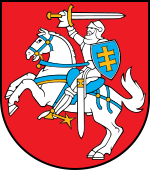- Lithuanian nationality law
-
Lithuanian nationality law automatically grants citizenship to persons born within the current borders of Lithuania. Citizenship may also be granted by naturalization. Naturalization requires a residency period, an examination in the Lithuanian language, examination results demonstrating familiarity with the Lithuanian Constitution, a demonstrated means of support, and an oath of loyalty. A right of return clause was included in the 1991 constitution for persons who left Lithuania after its occupation by the Soviet Union in 1940 and their descendants.
In 1989, the legislature passed a nationality act granting automatic citizenship to those persons who could establish their own birth, or that of a parent or grandparent, within Lithuanian borders.[1] Permanent residents not covered by these criteria were granted citizenship upon signing a loyalty oath.[1] Language proficiency was not required.[1] A 1991 treaty with Russia extended the definition of residency to those who had immigrated to Lithuania from Russia between 1989 and the ratification of the treaty.[1] Subsequent applicants for citizenship were required to meet a set of naturalization standards, including Lithuanian language testing.[1]
The citizenship requirements were the most liberal of those in the newly independent Baltic states. This is usually attributed to a relatively low level of immigration from other areas within the Soviet Union, resulting in a more ethnically homogenous population.[2]
In November 2006, the Constitutional Court of the Republic of Lithuania ruled that the Law on Citizenship (wording of 17 September 2002 with subsequent amendments and supplements), was "controversial, inconsistent and confusing." [3]. At issue was the possession of dual citizenship; the provision extended the right of citizenship, and hence the right to vote, to members of the post-Soviet Lithuanian diaspora, which was concentrated in the United States, Canada, Australia, and Argentina, and their children, grandchildren, and great-grandchildren. The most notable member of this diaspora was Lithuanian President Valdas Adamkus, who had become a United States citizen; he formally renounced US citizenship before taking the oath of office.
The petitioners held that basing citizenship on ethnic origin or nationality of the person violated the equality of persons and was discriminatory. The use and meaning of the term "repatriated" was especially controversial. The Lithuanian Seimas (parliament) has recently passed a temporary law, expiring in 2010, that grants dual citizenship in exceptional cases, most notably to those who were Lithuanian citizens prior to 1940 and who fled during the Soviet occupations, as well as to their children and grandchildren. The text of the law, as of July 15, 2008, is listed at the Seimas website: Lithuanian citizenship laws (English translation).
During November 2010 the Seimas passed a law liberalizing dual citizenship requirements. President Dalia Grybauskaite vetoed it, stating that: "According to the Constitution, dual citizenship is a rare exception, not a common case."[4]
References
- ^ a b c d e Roger Dale Petersen (2002). Understanding ethnic violence: fear, hatred, and resentment in twentieth-century Eastern Europe. Cambridge University Press. pp. 150–151. ISBN 9780521007740. http://books.google.com/books?id=sW8o6xIeHOwC&pg=PA151. Retrieved 9 February 2011.
- ^ Dovile Budryte (2005). Taming nationalism?: political community building in the post-Soviet Baltic States. Ashgate Publishing, Ltd.. p. 150. ISBN 9780754642817. http://books.google.com/books?id=UJMzpeUHkQcC&pg=PA150. Retrieved 11 February 2011.
- ^ Lithuanian Constitutional Court ruling on the Law of Citizenship
- ^ "News & Events - Lithuania: Dual Citizenship Law Vetoed". Library of Congress. http://www.loc.gov/lawweb/servlet/lloc_news?disp3_l205402394_text. Retrieved 2011-02-11.
External links
Nationality laws (category) By continent AfricaAsiaArmenia · Azerbaijan · Bangladesh · Bhutan · Burma (Myanmar) · China · Cyprus (Northern Cyprus1) · India · Indonesia · Iran · Iraq · Israel · Japan · Kazakhstan · South Korea · Lebanon · Malaysia · Mongolia · Nepal · Pakistan · Philippines · Russia · Singapore · Taiwan · TurkeyOceaniaEuropeAndorra · Austria · Belarus · Belgium · Bulgaria · Croatia · Czech Republic · Denmark · Estonia · Finland · France · Germany · Greece · Hungary · Iceland · Ireland · Italy · Kazakhstan · Latvia · Lithuania · Luxembourg · Macedonia · Malta · Moldova · Monaco · Montenegro · Norway · Netherlands · Poland · Portugal · Romania · Russia · Serbia · Slovakia · Slovenia · Spain · Sweden · Switzerland · Ukraine · United KingdomNorth AmericaSouth AmericaInternational
organizationsBy type Other Defunct Notes 1 Partially unrecognised and thus unclassified by the United Nations geoscheme. It is listed following the member state the UN categorises it under.Categories:- Lithuanian constitutional law
- Nationality law
Wikimedia Foundation. 2010.

